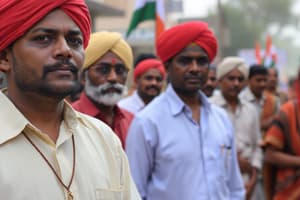Podcast
Questions and Answers
What specific facilities are provided to Dalit and Adivasi students by the government?
What specific facilities are provided to Dalit and Adivasi students by the government?
Free or subsidised hostels for education facilities.
What is the purpose of the reservation policy in India?
What is the purpose of the reservation policy in India?
To assist marginalized communities who have been denied opportunities to learn and work.
How does pollution play a role in the caste system according to the text?
How does pollution play a role in the caste system according to the text?
Pollution is used as a tool to separate or deny people access based on thoughts, values, and beliefs.
Why do laws like the reservation policy exist in India?
Why do laws like the reservation policy exist in India?
What governmental action is taken to implement the Constitution in tribal and Dalit areas?
What governmental action is taken to implement the Constitution in tribal and Dalit areas?
Why is the reservation policy considered significant and contentious in India?
Why is the reservation policy considered significant and contentious in India?
What does Article 15 of the Constitution of India state?
What does Article 15 of the Constitution of India state?
Who wrote the poem mentioned in the text?
Who wrote the poem mentioned in the text?
What was the social status of the Mahar caste in the fourteenth century Maharashtra?
What was the social status of the Mahar caste in the fourteenth century Maharashtra?
How have Dalits used the Constitution to seek equality?
How have Dalits used the Constitution to seek equality?
What do the lines 'A body is unclean, they say Only the soul is untainted' imply?
What do the lines 'A body is unclean, they say Only the soul is untainted' imply?
Why have minority groups drawn on the Fundamental Rights section of the Constitution?
Why have minority groups drawn on the Fundamental Rights section of the Constitution?
Why did Rathnam refuse to perform the ritual of washing the feet of the priests during the festival?
Why did Rathnam refuse to perform the ritual of washing the feet of the priests during the festival?
What was the reaction of the powerful castes in the village when Rathnam refused to perform the ritual?
What was the reaction of the powerful castes in the village when Rathnam refused to perform the ritual?
Why were some families from Rathnam's own community fearful of his refusal to perform the ritual?
Why were some families from Rathnam's own community fearful of his refusal to perform the ritual?
What was the significance of the ritual of washing the feet of the priests in Jakmalgur?
What was the significance of the ritual of washing the feet of the priests in Jakmalgur?
How did Rathnam's education play a role in his decision to refuse the ritual?
How did Rathnam's education play a role in his decision to refuse the ritual?
Why did Rathnam's family members before him perform the ritual of washing the priests' feet?
Why did Rathnam's family members before him perform the ritual of washing the priests' feet?
Flashcards are hidden until you start studying



